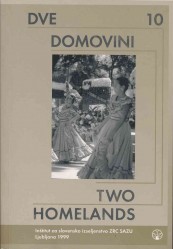The beginning, development and present state of secondary school courses among post-war Slovene immigrants in Argentina
Abstract
All those who live abroad value their mother tongue very highly. In our case this is the Slovene language. Post-war Slovene immigrants to Argentina felt it their natural duty to pass on the spoken and written language to their descendants. They therefore founded joint local centres and primary school and secondary school courses designed to complement the transfer of the mother tongue taking place in families. In the environment in which they live, it is often not understood why Slovene is spoken in the home, but parents stick to their decision, and by attending primary school in this environment the children master both languages, often a lot better than their contemporaries of other nationalities. The decision to enrol in secondary school courses is made by the children themselves, though they are already considerably under the influence of an environment which tries to achieve the necessary education with the minimum effort. For this reason enrolments are relatively few. I f in first-generation families pas sing on the mother tongue was a duty, in second-generation families consciousness of this duty lessens, which affects children mainly during the period of adolescence. We should of course not forget ethnically mixed marriages, which are so much the more exposed to assimilation.
Downloads
References
Brulc, Tone. Argentina. Ljubljana: Modrijan, 1997.
Brumen, Vinko. Iskanje. Buenos Aires: SKA, 1967.
Gogala, Mirko. Usode izseljencev. Buenos Aires: SKA, 1996.
Zbornik Svobodne Slovenije 1971-1972. Buenos Aires: Svobodna Slovenija, 1972.
Zbornik dela v zvestobi in ljubezni: Zedinjena Slovenija 1948-1998. Ur. Jože Rant. Buenos Aires: Zedinjena Slovenija, 1998.
Downloads
Published
How to Cite
Issue
Section
License

This work is licensed under a Creative Commons Attribution-NonCommercial-NoDerivatives 4.0 International License.
Authors guarantee that the work is their own original creation and does not infringe any statutory or common-law copyright or any proprietary right of any third party. In case of claims by third parties, authors commit their self to defend the interests of the publisher, and shall cover any potential costs.
More in: Submission chapter





